Powerful plants: nature-based solutions in Asia
Nature-based solutions are interventions that protect, restore or sustainably manage nature. More broadly, the term is used to describe non-traditional, alternative or indigenous approaches to environmental issues, like flooding, drought, or soil degradation, by harnessing natural resources.
Nature-based solutions are one of the themes at the forefront of this year’s UN Climate Change Conference (COP26). If done well, they can protect, sustainably manage, and restore ecosystems. That’s not all – they can even help address societal challenges such as climate change, biodiversity loss, and poverty and inequality.
In this post, we’ll take a close look at three successful nature-based solutions from Practical Action’s work in Asia. Introducing: an incredible plastic alternative, some small but mighty seeds and a flood defence system that’s both green and mighty…
Jute: a natural alternative to plastic
The weather patterns in Bangladesh are ideally suited to growing jute, despite the changing climate. Jute was once a major source of foreign exchange but lost out to artificial fabrics. As we become more aware of the environmental dangers of plastics, jute is popular once more.
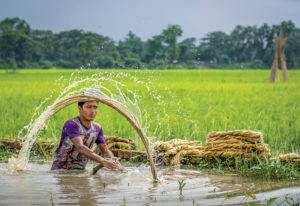
‘Retting’ the jute in water separates the useful fibre from the rest of the plan
Jute is an eco-friendly alternative to plastic because it grows quickly without the need for a lot of water or any artificial fertilisers or pesticides. It’s completely biodegradable and recyclable. It also absorbs carbon dioxide more quickly than many other plants. It even adds to the nutrients of the soil it grows in, rather than depleting them. Quite a roll-call of benefits!
We’re working with women in rural Bangladesh to build successful businesses from this extraordinary plant. Together, we’ve identified the fastest growing, most reliable varieties and we’re making sure there are plenty of seeds available to buy. We’ve sourced a simple machine which makes processing the raw fibre quicker. Unemployed young people are being trained in metalwork skills that enable them to manufacture these locally.
“I am a housewife and people did not encourage me to be an entrepreneur. They laughed at me. But I know, the jute processing machine and the training I’ve had have changed my way of living.”
Sheuli Begum, from Bozra in Bangladesh
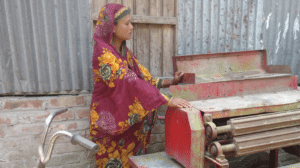
Sheuli with the locally-made machine she uses to process the jute ready for weaving
Plastic bags are banned in Bangladesh so there’s already a growing local market. Our work has also resulted in the development of new products such as sandals and yoga mats for the export market.
More than 400 women like Sheuli have taken our training and are now working for small and medium sized enterprises creating jute products. They have been able to gain some financial independence and improve their living conditions, all while improving the environment and reducing plastic waste.
“These days it doesn’t rain and, when it rains, it pours for days. Because of this, the crops die due to lack of water and also due to excess water. It didn’t happen like this in the past. I don’t know which seeds to plant for these conditions.”
Pooja Chaudhary, farmer from Dangisharan, Nepal
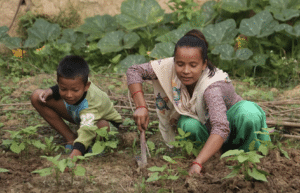
Pooja and her son working on their farm in rural Nepal, where climate change has disrupted weather patterns
Small is beautiful: climate-hardy seeds
Most people in Nepal rely on farming for food and income. Climate change has caused weather patterns to become more erratic, and many previously reliable crops can’t cope with the new conditions. Farming families are unable to grow enough to remain healthy and to earn a decent living.
The solution literally starts from the ground – with resilient seeds, better suited to changing climates and variable weather patterns. They produce delicious, spicy Nepa chilies; bitter gourd, a staple food that’s fed farming families for years; cauliflowers that can grow in even the toughest terrain; and hardy turnips, radishes and potatoes that grow all year round, even with extreme environmental challenges.
We’re working with farmers in Nepal so that it’s easier for them to buy climate-hardy seeds at a reasonable price. Training means they know when to plant them and how to tend them so that they stand the best chance of growing into big, healthy plants. And seed-saving techniques mean that farmers can create their own local ‘seed banks’, consisting of seeds perfectly suited to local conditions.
“All these varieties have been tested in Nepal’s soil and climate over and over again. If all the country’s farmers replace their traditional varieties with these new ones, the impact of climate change on our agriculture could be reduced considerably.”
Bahadur Gurung, Nepal Agricultural Research Council, talks about the potential of climate-hardy seeds to transform farming in the country
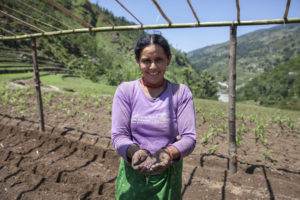
Laxmi is one of the farmers in Nepal we’ve worked with to identify and source climate-hardy seeds
Green and mighty: bamboo biodykes
In Bangladesh and Nepal, climate change has caused monsoon flooding to become increasingly severe and unpredictable. People’s crops, property and businesses are destroyed by floods every year.
Biodykes are an environmentally-friendly alternative to normal flood defences, where ‘normal’ means huge concrete structures that are expensive to build, damage the environment and are catastrophic when they fail.
We’ve worked with communities in both Bangladesh and Nepal to build biodykes by strategically planting locally-available trees and other plants, such as bamboo. The biodykes bind the soil and help prevent erosion, maintaining the original flow of the river, while also preventing the river from overflowing after heavy rainfall.
“Bangladesh is experiencing extreme climate change impacts that are affecting the national economy and development as well as the lives and livelihoods of the people. Many people are being uprooted from their homes and traditional jobs due to river erosion and erratic climate change.”
AK Abdul Momen, Bangladesh Foreign Minister, in a statement to the Climate Camp 2021
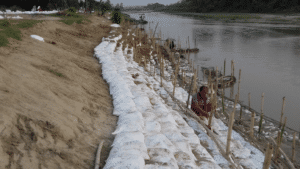
A biodyke being built in Bangladesh out of bamboo and sacks of soil, which will later be planted with saplings to further stabilise the structure
Biodykes deliver economic, environmental and social benefits. They really are a win, win, win solution – unlocking the triple dividend of resilience in terms of saving lives and avoiding losses when disasters strike, stimulating local economic activity, and delivering additional development co-benefits.
Biodykes have been instrumental in protecting communities’ homes, agricultural land and public infrastructure, reversing the annual cycle of flood losses and increasing the confidence of communities to invest in long term land and farm productivity.
“The river used to erode 4-5 metres of land every year and floods would wash away standing crops. We built this biodyke as a community and one person from every household contributes to maintaining it. This year there has been no soil erosion at all.”
Rongali Tharu, a farmer from Bangalipur, Nepal
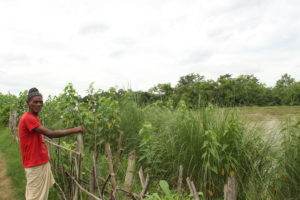
Rongali at the established biodyke that’s protecting his community in Nepal from floods
What’s next?
COP26 will be biggest summit ever hosted in the UK, with around 30,000 attendees expected in November 2021. It’s been described by climate change experts as the most significant climate event since the 2015 Paris Agreement. That’s because COP26 is the first moment when countries must report back on their progress since the Paris Agreement and set out more ambitious goals for ending their contribution to climate change.
One of our major roles is to balance things out by making sure voices from the Global South are heard. Our team will be on hand to listen to the negotiations and to help delegates from less developed nations provide research, evidence, examples and testimony to show the impact of climate change on their populations and the value of nature-based solutions.